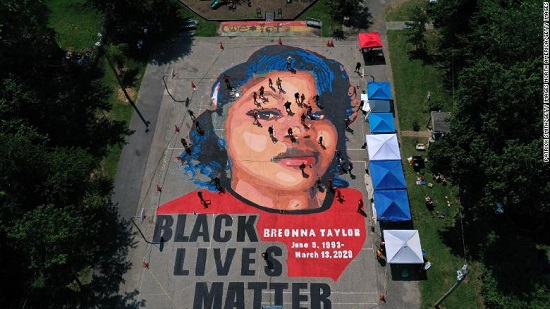A little after midnight on March 13, police officers in Louisville, Kentucky, killed Breonna Taylor in a hail of bullets fired into a darkened hallway. The Black emergency room technician was barely awake one minute and dead the next. She would become a flashpoint in a larger movement for the protection of Black lives, alongside slain men like Ahmaud Arbery and George Floyd. The killing of those men would lead to significant systemic change. Jackie Johnson, the district attorney accused of mishandling the Arbery case before she recused herself from it, lost her job at the ballot box to a candidate promising to restore community trust. Floyd s death brought about sweeping police reform and budget cuts not only in Minneapolis, but in cities and states across the nation.
But what about Taylor? The enduring legacy of Taylor s tragic loss must be grand jury reform.
Here s why.
In late September, Kentucky Attorney General Daniel Cameron presented evidence and charges to a grand jury for "wanton endangerment." Not for Taylor s death, but for a stray bullet that landed in her White neighbors home: aka property destruction. How do we know this? Because various people sued for the grand jury records, including Taylor s mother, the Courier Journal, and an unnamed grand juror, forcing the attorney general to release them. If he d had it his way though, we d be none the wiser.
The news Tuesday of the Louisville police department s move to fire two officers involved in Taylor s shooting is just and appropriate. But it should not have been left to interim police chief Yvette Gentry to do what the Kentucky attorney general did not -- hold the police accountable. While this action is an important step in reinforcing that truth matters, it is not enough.
Lack of transparency and failures of accountability are why much of the public doesn t trust prosecutors to hold cops accountable, especially those who take the lives of people of color. While Taylor s case is among the most recent examples, its failure to yield charges related to her death is nothing new. In 2014, a Ferguson grand jury failed to indict police officer Darren Wilson for shooting Michael Brown (Wilson claimed Brown struck him and that he was in fear of further harm). That same year a Staten Island grand jury did not indict NYPD Officer Daniel Pantaleo in the death of Eric Garner, who died in a chokehold gasping, "I can t breathe." (Pantaleo said in a statement he never intended to harm anyone.) Just like Cameron, then-District Attorney Dan Donovan hid behind grand jury secrecy, even though prosecutors have sole discretion over the process.
It s not supposed to be this way.
The origin of the grand jury dates back to the Magna Carta. It was created to ensure that charges of serious crimes are based on evidence approved by the community where the potential criminal acts occurred, and not based on just the prosecutor s discretion. The grand jury system has endured because its intent was to prioritize the rights of the innocent. The logic behind keeping it secret? If a grand jury failed to find sufficient facts to support a formal accusation or indictment, the innocent would be protected from the stigma of criminal investigation.
But what the Taylor case makes clear is that secrecy can also be used to subvert justice. In a press conference after the indictment, Kentucky Attorney General Cameron misleadingly said that homicide charges were not brought against the officers because "the grand jury agreed" that they were justified in returning deadly fire because Taylor s boyfriend shot at them. Cameron probably never imagined he would be contradicted by the grand jury itself. As an anonymous grand juror explained to media outlets including the New York Times, "questions were asked about additional charges [against the officers for Breonna Taylor s death] and the grand jury was told there would be none because the prosecutors didn t feel they could make them stick." Unfortunately, this comes as no surprise to either of us, who have spent our careers as a prosecutor and a defense attorney.
Grand juries shouldn t be used as they were in Taylor s case -- to rubber stamp a prosecutor s view of the evidence. In cases involving police or public officials, district attorneys must commit to moving for public release of grand jury minutes and a full report. By opening up the process, we can analyze whether or not the prosecutor skewed the results, and prosecutors can begin to earn back trust, and share power with the people.
The rules vary from state to state. In New York, grand jury reports can detail "misconduct, nonfeasance or neglect in public office by a public servant as the basis for a recommendation of removal or disciplinary action[,]"or "[p]ropos[e] recommendations for legislative, executive or administrative action in the public interest...." That means that if a grand jury truly doesn t approve charges, a report can reveal information about the conduct of the police officers to their department and inform the public if changes to state law are needed for further reform.
To be clear, public release of grand jury records and a report are not substitutes for actual accountability. Nor is justice served by interim police chief Gentry s justifiable move to terminate two of the officers connected to the Taylor case. These are positive steps but not enough.
We need prosecutors to bring charges against officers on a consistent basis when they violate the law, not just in high-profile cases like Taylor s. Releasing grand jury minutes in these cases is an important step toward rebuilding a criminal justice system so that it is rooted in fairness for everyone.
George Floyd s death sparked nationwide police reform; Breonna Taylor s death should end grand jury secrecy in cases involving police and public corruption.


